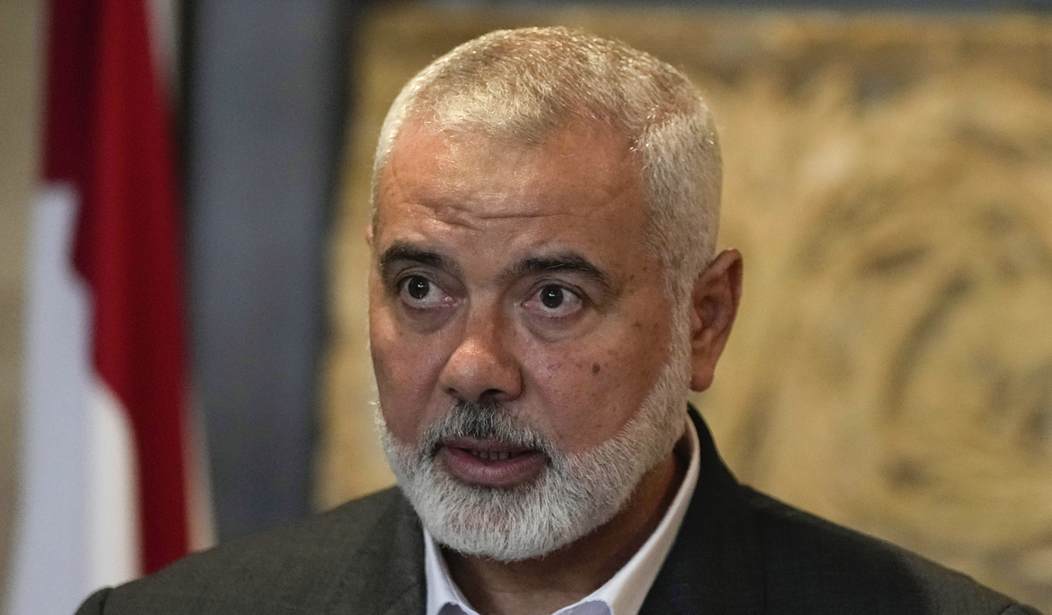For the past week, we have waited for the other shoe to drop after Israel's targeted hits on Hamas, Hezbollah, and IRGC leadership. The assassination of Ismail Haniyeh in particular created an irate reaction in Tehran, in which the Supreme Leader himself swore to unleash a devastating blow against the Israelis.
And then ... nothing has happened. Hezbollah took a few minor shots at northern Israel that landed, but otherwise the threats have hung in the air while Israel's allies organized a defense and tried to avoid any further escalation via diplomatic channels. And now the latest rumor from Iran is that the new president has explicitly asked Ayatollah Khamenei to cancel the retaliation in order for him to pursue better ties to the West:
Iran's president, Masoud Pezeshkian, has reportedly asked the Islamic Republic's supreme leader, Ayatollah Ali Khamenei, to refrain from attacking Israel, according to a report by Iran International on Wednesday.
Pezeshkian warned Khamenei of the potential attack's effects on his presidency, with Iran International quoting sources familiar with the development.
The new Iranian president cautioned that an Israeli retaliatory attack could cripple Iran's economy, infrastructure, and even lead to the country's collapse.
That ... sounds a bit out of character for the kind of 'leadership' the ayatollahs usually allow to emerge. So does the reported reaction from Khamenei, which the source describes as "noncommittal" during Pezeshkian's presentation. His fears are hardly irrational, since Israel demonstrated pretty clearly after Iran's prior retaliation that they can hit anything they want if Iran escalates, and Israel has made clear that they won't hesitate now to respond on scale.
But still, this sounds a little too good to be true. Or is it? WaPo nat-sec columnist David Ignatius claims that the White House believes that they may have dissuaded the Iranians from anything other than a token attack. And they have also leaned on the prospects for Pezeshkian to do so:
The Iranian response has been complicated by seeming confusion over the circumstances of Haniyeh’s death. Tehran at first claimed he was killed by an Israeli missile, requiring a similar Iranian response. But officials say that Tehran has concluded privately that he was instead eliminated by a concealed bomb, perhaps prompting a different response. The Iranian regime is said to have conducted similar targeted attacks in third countries.
Tehran may also be dissuaded by the U.S. show of force this week, and secret White House communications passed via the Swiss embassy in Tehran and the Iranian mission at the United Nations. “Iran understands clearly that the United States is unwavering in its defense of our interests, our partners and our people. We have moved a significant amount of military assets to the region to underscore that principle,” a senior administration official messaged me.
U.S. messages to Iran have also made clear that the risk of a major escalation is extremely high, with serious consequences for the stability of the new government of President Masoud Pezeshkian.
Ignatius also claims that Biden's team has leveraged US anger over the strike on Haniyeh into forced concessions on a cease-fire deal in Gaza:
But since the contentious phone call, Netanyahu has moved toward the U.S.-brokered cease-fire deal. As of last week, Netanyahu was insisting on changes in the U.S.-negotiated formula that mediators feared would be dealbreakers. This week, he is said to have advised at least one member of his right-wing coalition that he supports the pact without amendments.
That sounds more likely to have moved the Iranians into a holding pattern. The only way to save their proxy army in Gaza is with a cease-fire that doesn't keep the Israelis on the ground there. Without a cease-fire, the Israelis will chew up what's left of Hamas and then start on Hezbollah, especially south of the Litani in Lebanon. Plus, the Israelis continue to use their intelligence advantages to knock off key leaders in the chain of command in each of their proxies. Tehran needs to stop the bleeding and revamp their approach.
Or, at least they do if they want to keep the regime in operation. Whether the warning comes from Pezeshkian, the US, or Netanyahu, it's clear that the Israelis' next strike will be calculated at forcing the regime to crumble. Has Khamenei figured that out? We'll see soon enough, but the hesitation to strike is starting to look like recalculation on some level.
Update: Perhaps these developments have the Iranians thinking twice, too. The Saudis and Jordanians denounced the killing of Haniyeh, but they also told Tehran that any incursion into their airspaces will be met with an armed response:
The Jordanian Foreign Minister Ayman Safadi informed Tehran that if it responds to Israel's assassination of Ismail Haniyeh, Jordan will not allow it to enter its airspace, Sky News Arabia reported.
Riyadh has declared it will not allow Iranian missiles or drones to pass through its airspace en route to Israel, a senior member of the Saudi royal family told Kan News on Monday evening. The official emphasized, "Riyadh will not allow any foreign object to pass through."
This statement was also sent directly to Iran.
Would that entirely deter Iran? Perhaps not alone, but it would complicate an attack on Israel with any more depth than the previous retaliation.








Join the conversation as a VIP Member